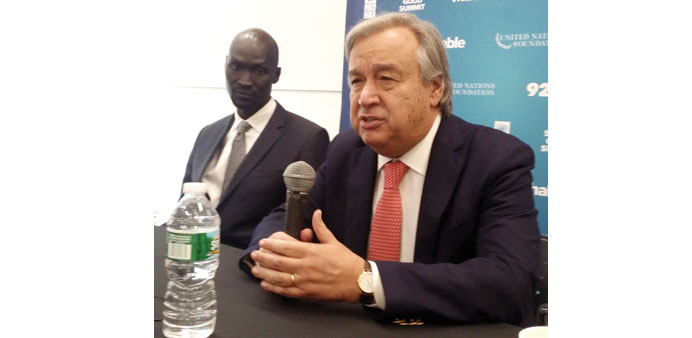UN High Commissioner for Refugees Antonio Guterres (right) tells journalists about the current refugee crisis in Europe. He was joined by a former political refugee in the US. PICTURE: Joey Aguilar
By Joey Aguilar
Staff Reporter
A massive facility to receive and host migrants in Greece temporarily is needed to properly organise the influx of refugees into Europe, United Nations High Commissioner for Refugees (UNHCR) Antonio Guterres has said.
Speaking at the UN Foundations 2015 Global Issues Press Fellowship in New York recently, Guterres stressed that refugees will continue to run from border to border if such measures were not put in place.
“This can only be done with European Union’s involvement since the Greeks alone with their financial difficulties cannot do it,” he noted.
Guterres cited the absence of an effective mechanism to host migrants temporarily and move them to other European countries after screening them “according to the extent possible to their preferences.”
He said the crisis which has caused a huge impact on Europe remains manageable provided that conditions will be created to receive refugees and allow them to be distributed among European countries “proportional to the capacity of each of the countries”.
According to the UNHCR, the number of people seeking refugee status continued to increase since the first half of last year due to wars in Syria and Iraq, besides conflicts and instability in Afghanistan, Eritrea and other parts of the Middle East.
UNHCR noted that 38 European countries recorded 264,000 asylum applications in 2014, a 24% increase compared to the same period of 2013.
Turkey hosts an estimated 1mn Syrian refugees as of August 2014 and about 217,000 of them stay in 22 camps.
UNHCR also reported that a growing number of Syrians are fleeing to other countries in the region, many risking their lives crossing
the Mediterranean.
“The other thing we have been asking is more and more opportunities for resettlement, more and more humanitarian missions, and more flexible use of policies,” Guterres said.
He noted that they recently launched in Turkey some 58 scholarships for universities and 5,200 Syrians applied.
“It means that if European universities could admit them on student visa, these people could come to Europe legally without any problem,” the UNHCR senior official added.
He believes that such initiatives would create a huge impact, as with family reunification programmes.
Without legal opportunities for people to come, Guterres said these people put themselves in the hands of smugglers.
“Smugglers exploit them, they sometimes pay thousands of dollars to be able to come. Traffickers violate their human rights, and they put their lives at risk,” he said.
“We need more legal mechanisms for people to come to Europe, the US, to Australia, and to other parts of the developed world.”
However, the UNHCR pointed out that some countries had set up barriers to prevent asylum seekers and refugees from entering their borders.
In Italy and Malta alone, UNHCR noted that some 10,000 unaccompanied and separated children have arrived during the first nine months of this year to seek protection in Europe.
About the safety of refugees going to Europe as the weather gets worse, Guterres reiterated the need for proper reception “at entry level” where people would be assisted, sheltered, and registered through a screening process.
“Those who are found eligible should be moved by plane or by whatever (means) to countries where they would find a new life instead of running from border to border with countries closing the borders, sometimes changing policy twice in 48 hours,” he said.
“Ideally there should be avenues for people to be able to come without having to come by boat with the smugglers and traffickers taking care of them,” he added.

